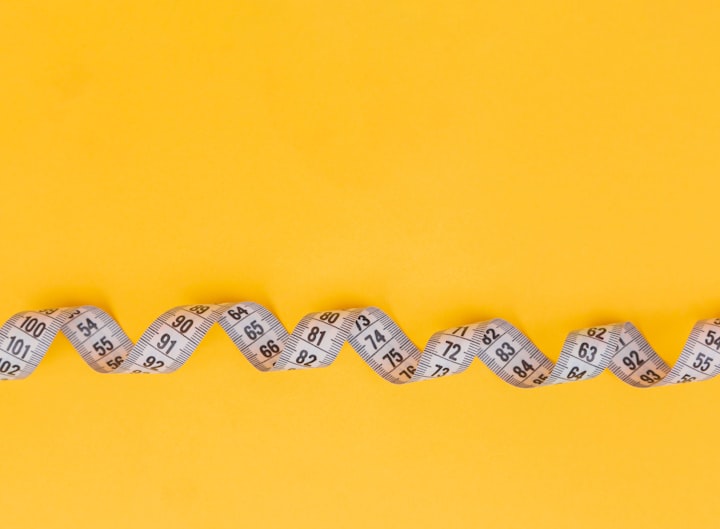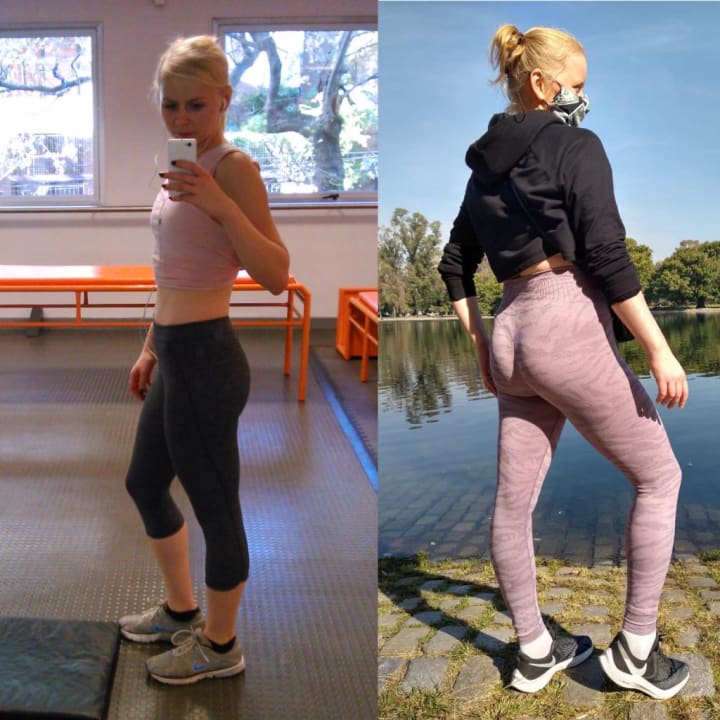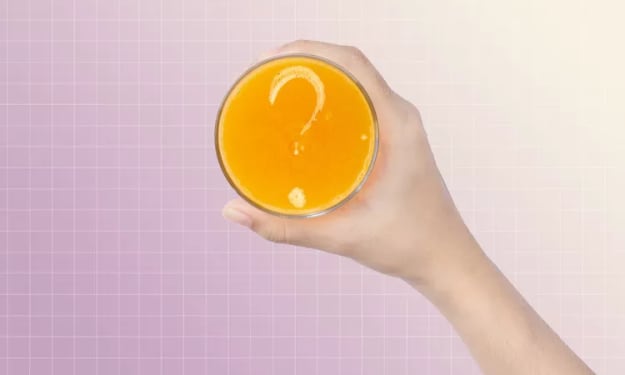The Only Diet You Need Is From Diet Culture
How I don't maintain abs on 1300 calories a day. Or keto, or paleo, or Atkins. Why you shouldn't, either.

I'm seeing a lot of terrible fitness advice online.
Instagram, TikTok and YouTube are filled with food and training journals with instructions on how to finally reach your dream body in a #healthy and #balanced way. They're all accompanied with a photo or video of a person with visible abs, living their best life. And of course, a link to buy their meal or exercise plan, or some supplements.
"Full day of eating, 1300 calories."
Eat some rice crackers with a thin layer of avocado before your workout, then some rice and half a chicken breast for lunch, a low-fat, no-sugar, paleo, keto, no-grain, low-carb chocolate cookie for a snack, and some steamed carrots for dinner. In between meals, how about a delicious cup of tea, no sugar, to keep hunger away?
See how easy it is? You'll drop X amount of weight in 30 days and get ready for summer
Don't starve yourself, please
First things first, 1300 calories per day is anything but a full day of eating for a grown-up, especially if you're physically active. It might be in some rare cases, but for most adults, this kind of a restricted diet will inevitably lack essential nutrients.
You're depriving your body of what it needs to function properly.
This kind of a diet tends to have two kinds of outcomes. The first one is that, since it's not a healthy one you could sustain over time, you'll gain all the weight back. Usually, with a couple of extra pounds added because you might have accidentally slowed down your metabolism.
Your body is actually a really smart machine, developed gradually over millions of years. This machine has evolved with one goal: survival. It will adapt to its surroundings and your lifestyle. When you restrict your calorie intake, you're only teaching your body to survive on fewer calories. At first, you will lose weight, but it will get harder and harder over time, making you restrict your calories even further.
Another thing that happens on those diets is that they'll make you malnourished. When you only focus on calories and macronutrient content, you'll often forget about all the micronutrients your body needs to work well. If you limit carbs, for example, you'll have to rule out fruits and starchy vegetables. But these hold important vitamins and minerals you'll never get from that chicken breast that are crucial to guarding you against all kinds of chronic diseases. They'll also keep your body in balance, with your hormones working well so that you can keep working towards your goals, whatever they may be.
And guess what? Fiber is a carb. If you limit carbs, you'll likely eat too little fiber. This often gives you immediate digestive issues, like constipation, but it can also cause a lot of damage to your gut microbiome in the long term. This can lead you to several negative outcomes, including celiac disease, IBS, Crohn's disease or any number of other painful and limiting conditions. Speaking as a person who developed rosacea thanks to a dysbiosis (after a couple of bouts of antibiotics), it's not worth it.
But one thing we don't pay attention to enough is that most likely, calorie restriction is just an eating disorder.
If you're interested in the fitness niche and you look for content online, the sad thing is that most of the quality information is hidden under a mountain of horrible diet culture misinformation like this. And if you're already developing an eating disorder, seeing this kind of content will give you ideas. You'll start comparing your own diet to theirs, and counting calories becomes an addiction. It's a slippery slope.
Trust me, I've been there.
Diets are just marketing
If you follow those diet influencers long enough, you'll see that many of them will eventually write an "honest" post about their relationship with food. These journeys often end with the realization that giving their bodies 1300 kcal per day wasn't healthy or sustainable, and that eating only brown rice, broccoli and chicken breast wasn't nourishment. Some of them recognize they had obsessive behaviors around food.
Unfollow influencers who make you feel like you should limit food groups or count calories. It's okay to not diet. It's best if you don't.
The only diet you need is from diet culture.
Living a healthy life isn't as hard as they portray. It's common sense. Now, I understand it's psychologically hard for many people, and it does take a lot of learning to cook and unlearning your unhealthy habits. But eating healthy is no more complicated now than it was a hundred years ago. Human bodies have stayed the same. The only thing that has changed was the rise of the multi-billion dollar fitness industry that tries to teach you not to trust your instincts so you'll buy their supplements.
Always remember, there's somebody out there making money off your diet plan, protein shake or that packaged low-carb cookie with twenty ingredients you can't pronounce.
Why weighing food is bad
Calculating your calorie needs based on just your body weight and your perceived activity will always be inaccurate. You don't know exactly how many calories are in a banana, you'll only be calculating estimates. Also, there are many ways a certain amount of calories can be packaged. You can eat a Big Mac with fries and a Coke, and make it fit into your calorie targets. Or, you can eat healthy foods, and get all the necessary nutrients.
Two bodies also don't react the same way to the same food, and some people will do better with higher amounts of carbs or protein than others. What's always certain is that you'll get long-term results when you focus on health and eating naturally.
I know, people want fast results. I have a friend who was obese and lost a tremendous amount of weight with calorie restriction, because she wanted to get to the finish line quickly. Her other option had been gastric bypass surgery, so I guess diet at least was less invasive. But the problem is, neither one of these options is for the long term.
She did it, and got really skinny. And then she put it all back on. She repeated the cycle of times, actually, with the same results. Quick weight loss, followed by a rapid gain as soon as she gave herself permission to slip into old habits. And I think it was in large part because the diet was so mentally draining and unhealthy.
But instead of repeating the same cycle and putting her body through this stress time again, maybe she could have quit dieting. Maybe she wasn't supposed to lose four pounds per week. Maybe the right amount isn't even four pounds a month, but even slower. Maybe she should skip the scale altogether, and just focus on feeling better.
Weight loss is not always fat loss
The people around you might not be helpful with their compliments. When I got COVID, I lost close to 7 pounds because of, you know, lying in bed in pain and not being able to eat for ten days. When I told my friends, they congratulated me.
I was shocked, not just because it was so awful that people would congratulate you for losing weight because you have a disease. It was also because of the sheer ignorance of people thinking I had lost 7lbs. of fat in that time.
You don't lose body fat by lying in bed for two weeks, not eating. You'll lose your glycogen storages, but you'll get them back as soon as you eat a carb. The same will happen if you're on a restrictive diet. I recovered half my "weight loss" in two days when I felt good enough to eat again. The rest of it, after two weeks in the gym.
It had been just fluids and muscle, not fat. You lose fat by changing your metabolism. You need to show your body it can lose the weight and that you're not starving. The faster you lose weight, the more likely it is that you'll lose muscle and bone mass, not fat.
Magical thinking
I've noticed that people always look for a simple answer to why somebody lost weight. They expect you to say it was keto, or a magical tea, or adding some protein powder to your smoothie, or freezing their fat in an expensive treatment.
I've seen it with articles on this platform, too. They go viral because they sell people a simple solution to having visible abs, year-round.
It's magical thinking.
When you tell them your weight loss is due to working out every day, eating more vegetables and whole grains, sleeping eight hours a night and drinking a gallon of water, they look disappointed.
This story won't go viral like the ones promising SIMPLE WEIGHT LOSS WITH THESE 5 MAGICAL SUPERFOODS!!!". (And if it does, it's because people are so mad.)
We're so caught in diet culture marketing that we don't see the common-sense solutions to our problems.
There is a way to get there, safely and through a healthy diet. You don't have to go vegan, like me. It's easy, it's common sense, it doesn't limit essential macronutrients.
Understand that lasting results and health will most likely take a while. Stop thinking at this time as lost time. It's the time you're taking to become healthy. You might even notice you don't need to be skinny to feel good.
Here's the secret
So, here's the true secret to being healthy and losing weight. Not four pounds per week, but gradually and sustainably. No purchase necessary here. I'm not trying to sell you a diet plan.
So, what's the secret? Take it from Michael Pollan:
"Eat food, not too much, mostly plants."
There are a couple more rules than that, but they all fit this definition.
Eat real food, learn to cook it yourself and take your time to chew and enjoy it. Just eat food when you're hungry. Include starchy vegetables and whole grains to give you energy. Minimize your intake of alcohol and foods with lots of ingredients, as well as oils and sugar. It might be better to give yourself permission to eat them 10–15% of the time, so you don't get frustrated and can sustain healthy eating in the long term.
Find some kind of exercise you enjoy, and do it on most days. Try to vary between different movement patterns. If you don't like exercising, walk when you can, and try to stay active in general. Stretch to maintain mobility and feel good. Try to manage stress and spend time with your loved ones.
When you start digging into nutritional science, you'll notice it all boils down to the same common-sense approach. Mostly, just follow the lifestyles of the people in the Blue Zones to live a long, happy life and keep your weight under control. Just real food, mostly plants, not too much.
As a bonus, if you want to change your body, don't be afraid to pick up weights. Lifting weights will help you switch your mindset over time, I promise. You'll start seeing your food as a way to fuel your movement, instead of something you need to deprive yourself of.
What I do
I personally eat three times a day with a couple of snacks. I'm vegan, so the plant part is easy, and over the years I've learned to crave whole grains more than refined ones. I work out 4 to 5 times a week, mostly lifting heavy weights, occasionally cardio because I enjoy it. I try to get in 10,000 steps in every day, but I don't every day, and I don't obsess over it.
I've put on at least 15 pounds of weight since I started lifting weights, in exactly the places where you want to put on weight. The scale does not say anything.

When I want to eat sugar, which is natural and not bad, I eat some fruit. Lots of it, at least about a kilo (2lbs.) every day. No, it doesn't make you fat if you eat your sugar as fruit, with all the fiber and the micronutrients it comes packaged with. Your body has evolved to digest it. You are a chimpanzee, after all.
It really is as simple as that. No diet, no protein bars or shakes, no meal plan from my favorite influencer. Common sense.
--
This story was originally published by me, on Medium.
About the Creator
Taru Anniina Liikanen
Finnish by birth, porteña at heart. Recovering political ghostwriter. Fiction, relationships, politics, bad puns, popular and unpopular opinions. Occasional dinosaurs, because dinosaurs are the best.






Comments
There are no comments for this story
Be the first to respond and start the conversation.